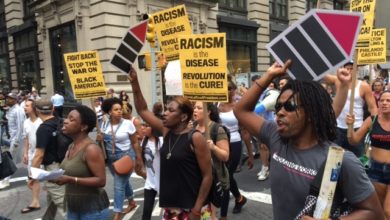On February 7, members of the George Washington University community in Washington, D.C., received an email from Mark Wrighton, the newly elected president of the university, regarding several posters depicting “bias and racism against the Chinese community” that were displayed around campus without administrative permission.
The array of posters included a particularly shocking and racist one in which a Chinese athlete is sliding forward a curling stone that looks like the COVID-19 virus. Concerned students and others noted that this imagery, which has existed since the onset of the pandemic, identifies Chinese people with the COVID pandemic and is often tied to baseless conspiracy theories that the Chinese state or Chinese people “invented” and spread COVID-19. This imagery and rhetoric are tied to a rise in anti-Chinese and anti-Asian attitudes, and even outright violence, against Chinese and Asian people in the U.S. and around the world.
Over the last several years, the number of Chinese students at GWU has risen steadily. There are currently more than 2,300 Chinese students at the university — and according to national trends, these students are at risk of hate crimes. Anti-Asian hate crimes rose 76 percent from 2020 to 2021.
After the posters appeared on Feb. 3, Wrighton received numerous emails from individual students and the GWU Chinese Student and Scholar Association expressing concerns about the content of the posters. Messages were also sent to various bodies on campus, including the International Student Organization. Students also posted on social media.
Wrighton had initially replied to the students’ and organizations’ concerns that he too was “personally offended” by the posters and was working to have all of the posters removed “as soon as possible.” He called the situation a “terrible event” and was determined to find the offender.
However, over the course of a single day, Wrighton drastically reversed this decision, claiming he had responded too “hastily” without enough information. He rescinded his decision to have the posters removed and the racist attack investigated, and even said he “does not view these posters as racist.” He said he wanted to make it clear that he supported the right of “freedom of speech — even when it offends people.”
Currently, George Washington University is currently facing a lawsuit from Palestine Legal regarding discrimination and the silencing of Palestinian students and organizations. In 2015, GWU forced a Palestinian student to remove a Palestinian flag from his window, resulting in widespread media coverage and resulting in an apology from GWU.
GWU students say that these cases show that for the university’s administration, free speech is doled out conditionally and selectively. Wrighton has confirmed he will permit the posters on campus.
The posters were created by a Chinese-Australian activist, who is not a GWU student, but opposes the Chinese government. By contrast, 91 percent of Chinese people in China support the leading Chinese Communist Party. Supporters of the posters argue that since they were created by an artist of Chinese descent they should be viewed as legitimate forms of political artwork. Regardless of the artist’s origin, activists and students that oppose the growing U.S. war drive against China and increasing anti-Asian violence say that depicting a Chinese individual spreading the COVID-19 virus directly contributes to anti-Asian violence.
After learning about the artist behind the posters, President Wrighton said, “upon full understanding, I do not view these posters as racist; they are political statements.” Although he initially said he found them offensive and concerning, Wrighton now is siding with an artist on the other side of the globe rather than his own student body.
Many in this student body know that just because something is a “political statement” does not mean that it is not racist. Advocates and Chinese students vow to organize against anti-Asian hate, despite Wrighton’s support for the sinophobic posters.
Photo: Protest against anti-Asian hate crimes in D.C. in March 2021. Liberation photo






